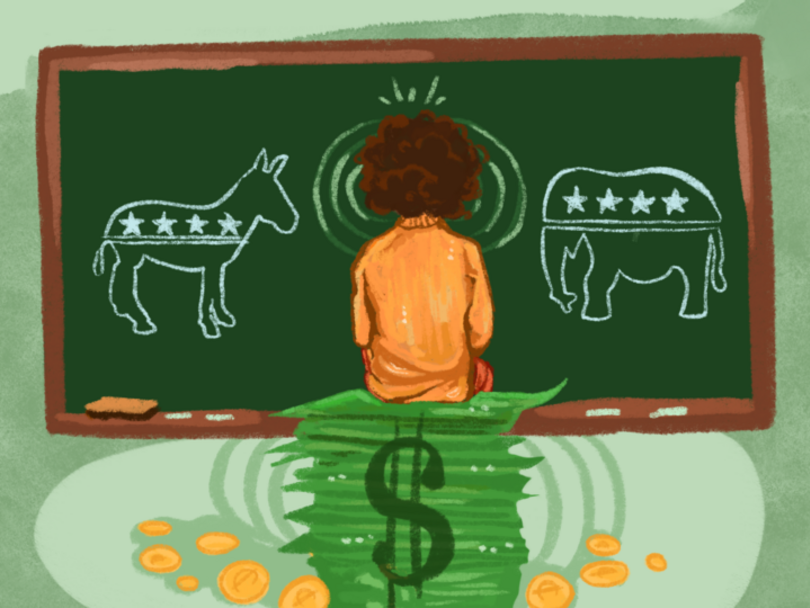Opinion: Trump’s tariff costs show need for improved political literacy

Trump’s tariffs exemplify a lack of political understanding that leaves voters vulnerable to false promises. Our columnist emphasizes the necessity of learning policy to prevent harmful agendas sold as patriotic solutions. Hannah Mesa | Design Editor
Get the latest Syracuse news delivered right to your inbox.
Subscribe to our newsletter here.
President Donald Trump’s recent tariff policies are not only straining the pockets of his most loyal supporters, but they’re also revealing the need for stronger political literacy in the United States.
As economic pressure grows in communities that most heavily backed Trump, the gap between political allegiance and economic consequences is becoming impossible to ignore. Understanding who writes policy, who benefits from it and who bears its cost isn’t just civic homework — it’s a survival skill.
Trump first announced his tariff plan on Jan. 20, the day he was sworn in for his second term. He initially declared 25% tariffs on Mexico and Canada, but his trade war has increased dramatically since.
Nationwide, Trump framed his tariffs as a way to protect American industries and punish foreign competitors, promising voters economic revival. Many supported these measures under the belief that the tariffs would hurt exporters like the European Union and China, not themselves. Now, the voters who once cheered these policies feel blindsided by the resultant financial burden.
Had these voters been equipped with the political literacy needed to assess the effects of these tariffs, the disconnect between Trump’s promises and the likely economic reality might have been more widely apparent.
In New York specifically, Sen. Chuck Schumer warned that the effects would be detrimental.
“It’s a gut punch to upstate New York’s economy… that could devastate our families and small businesses in ways we haven’t seen since the height of the pandemic,” he said.
But many voters lack the tools to understand that Schumer’s concerns aren’t just political pandering. Really, his warnings are grounded in the economic reality already unfolding in towns across upstate New York where rising costs are beginning to squeeze the very communities that helped send Trump back to the White House.
An example of this “squeeze” is the story of an upstate New York dairy farmer who believed Trump’s claims that foreign exporters like Canada would be responsible for paying the tariffs, not American importers and producers. But rising prices of farming goods provided clear evidence that the burdens of tariffs are landing closer to home.
This story reflects the damaging effects of political illiteracy. As the world becomes more politically polarized every day, it can be hard to differentiate between facts and what politicians say to maintain a loyal voter base.
Voters must be able to evaluate how proposed policies will affect their lives because the consequences are personal.

Joe Zhao | Design Editor
Tariffs don’t exist in a vacuum; they shape the prices of everyday goods, threaten jobs and strain already fragile local economies. When voters don’t fully understand how these policies function, they become more susceptible to simplified slogans and false promises. The ability to critically evaluate leaders’ decisions and connect them to real outcomes is what turns passive voters into active participants in democracy.
Some may argue that tariffs are beneficial to protecting U.S. jobs and manufacturing, and therefore, Trump voters knew exactly what they were voting for. However, evidence suggests that many voters didn’t fully grasp how these policies would play out in their own communities.
This could have been a result of the often confusing, inaccessible way policy is communicated. Voters in this country don’t have access to clear, nonpartisan information imperative to fully grasping the potential impacts of their vote.
A 2023 study from the U.S. Chamber of Commerce Foundation found over 70% of Americans failed a basic civil literacy quiz. Further, of the two-thirds of Americans who studied civics in high school, only 25% are “very confident” in their ability to explain how our government operates.
This data is extremely concerning, given that modern democracy thrives on informed participation; democracy can’t function effectively if people aren’t engaged and informed.
When voters lack the knowledge to assess how policies will affect them or simply don’t understand how policy-making structures work in the first place, they become more susceptible to political messaging that prioritizes emotion over accuracy. In turn, this erodes accountability; elected officials face less pressure to deliver on the practical outcomes of their platforms and more incentive to rely on eye-catching slogans that obscure reality.
Americans shouldn’t have to learn about the real cost of policy by living through its fallout. If we want to avoid repeating the same cycle, where policies like tariffs are sold as patriotic solutions, we must treat political literacy as a common interest.
That means investing in civic education, improving access to transparent information, and encouraging critical thinking across all ages. A more politically literate public is a more empowered one.
When voters can connect the dots between campaign promises and everyday impacts, leaders will be forced to lead with clarity, not confusion.
Emma Donohue is a freshman studying political science and citizenship and civic engagement. She can be reached at efdonohu@syr.edu.






